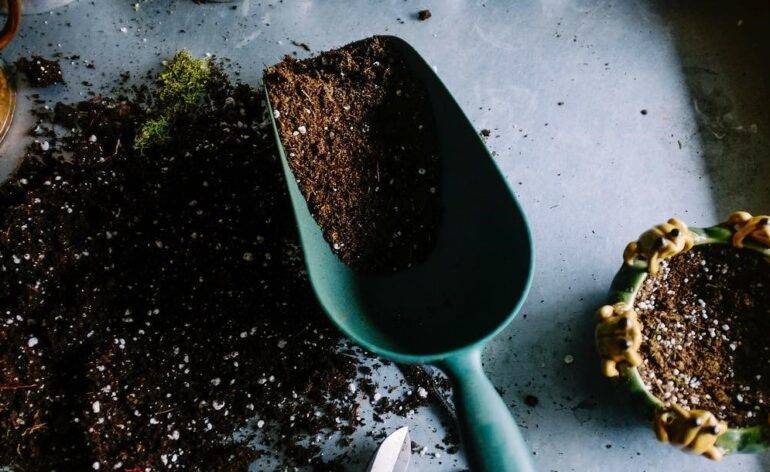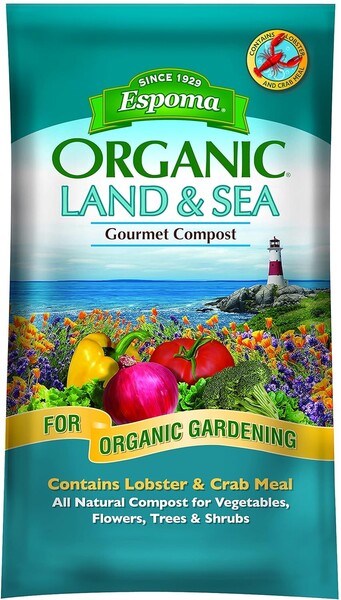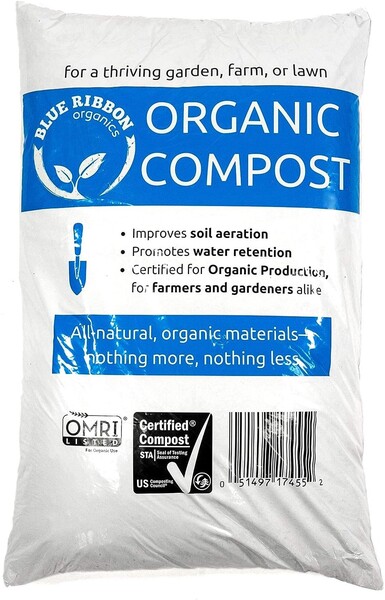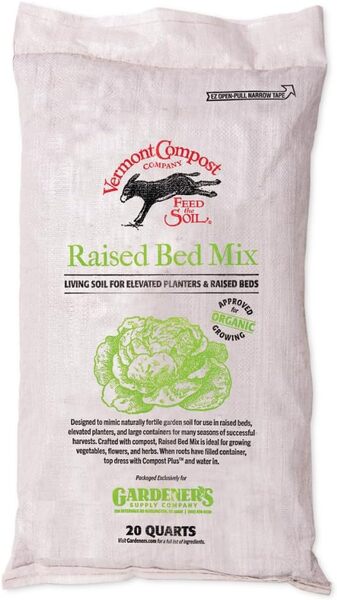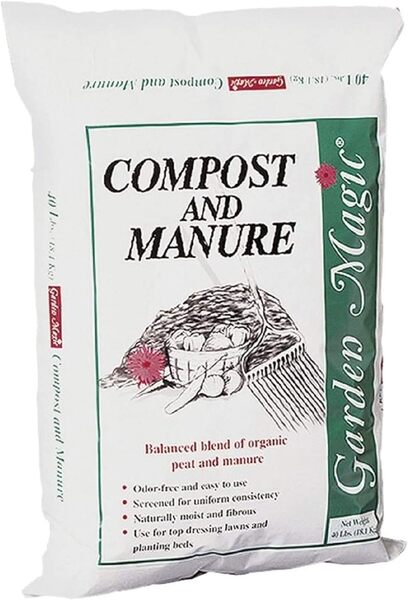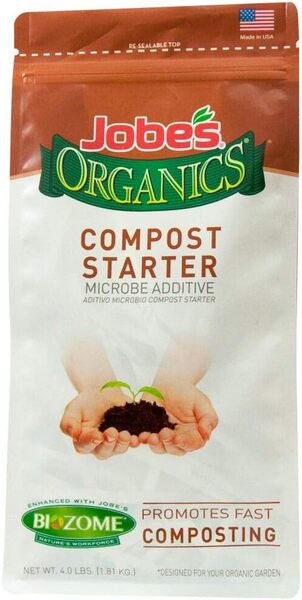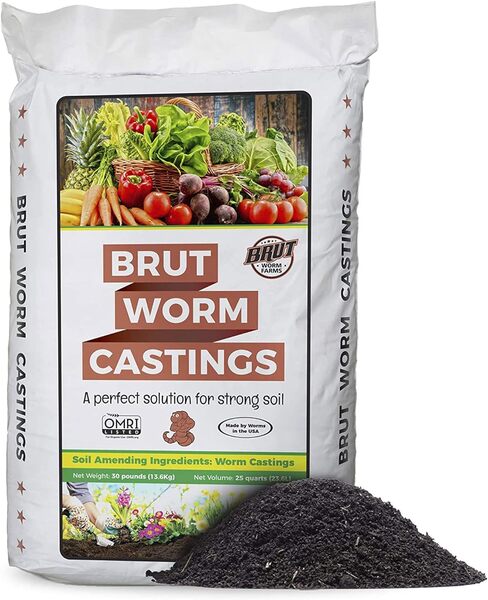6 Best Composts for Vegetable Gardens to Improve Your Yield
We independently evaluate all recommended products and services. If you click on links we provide, we may receive compensation.
Composts are an essential part of the growing process for any vegetable garden, helping to renew soil, provide essential nutrients, and give soil structure. Using compost in my vegetable garden has always felt very natural and positive to me, which is why I’m excited to write this article about the 6 best composts for vegetable gardens that I’ve used.
There are a lot of factors that go into choosing the right compost for your garden, encompassing everything from what types of vegetables you’re planning on growing to whether you raise your plants from seeds or transplant seedlings. But, when you find the perfect compost for vegetables, you won’t be able to believe the results you’ll get.
Read on to find out more!
Key Takeaways
I took a long look through my gardening shed and my Amazon purchase history when coming up with this list. The process helped remind me of all the different brands and types of composts I’ve tried out over the years. Eventually, I came to the conclusion that Espoma Organic Land and Sea Gourmet Compost with Lobster & Crab Meal is the overall best of the best composts for vegetable gardens. It’s made from outstanding natural ingredients that can replenish your soil. It’s also an extremely consistent product, with no differences in quality across the many bags I’ve purchased (which is a big, big plus when it comes to composts).
I’ve also included a couple of options on the list that have more limited use cases than the above product, such as a soil/compost mix (Vermont Compost Company High-Nutrient Compost-Based Potting Soil for Plants & Vegetables) and a compost starter (Jobe’s Organics Fast Acting Granular Fertilizer Compost Starter) for gardeners who want to start their own compost pile.
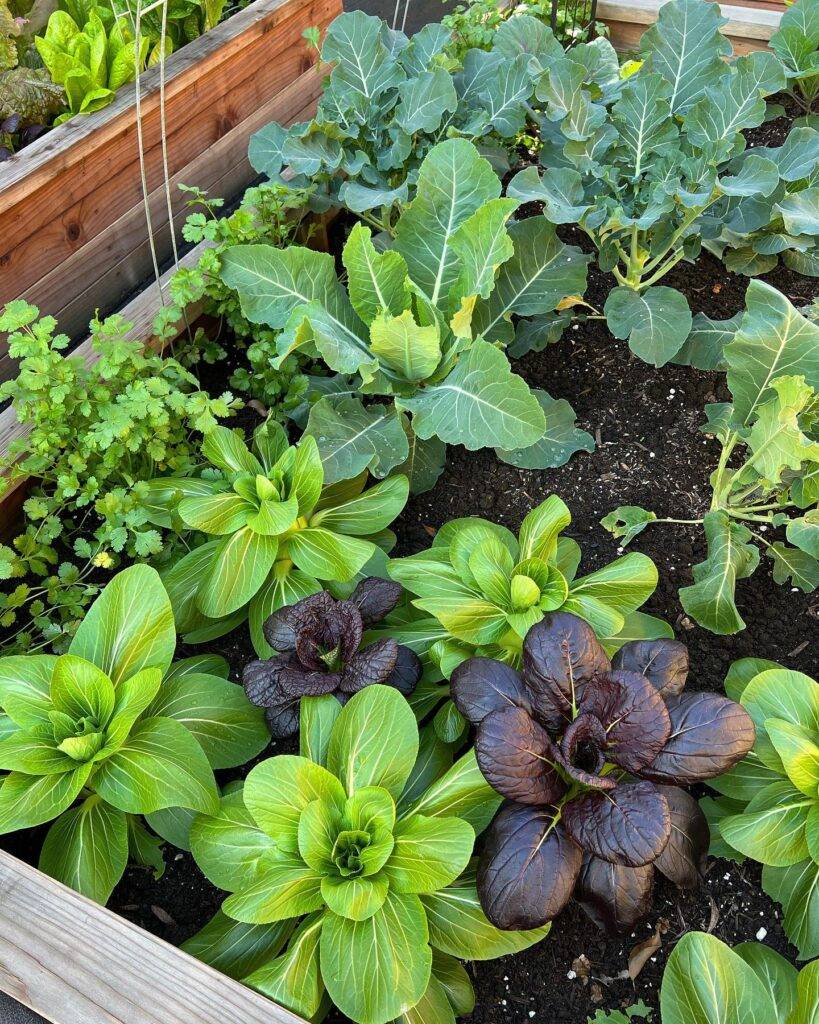
gardenwithmiranda / Instagram
Best Overall: Espoma Organic Land and Sea Gourmet Compost with Lobster & Crab Meal
Why this is a quality choice: Espoma Organic Land and Sea Gourmet Compost with Lobster & Crab Meal stands out as an exceptional compost blend crafted from premium natural components. I rate it as the top choice among various garden composts because of its versatility across different gardening projects (suitable for vegetables, flowers, shrubs, and trees) and impressive customer feedback. Additionally, it incorporates both endo- and ecto-mycorrhizae, enhancing root absorption of water and nutrients.
Who is this for? This compost is ideal for most home gardeners, offering significant benefits across a wide range of growing environments.
Flaws but not deal-breakers: It’s important to note that this mix contains limestone, making it unsuitable for plants requiring an acidic environment.
Type: Organic | Ingredients: Aged forest products, sphagnum peat moss, humus, limestone, lobster meal & crab meal | Package size: 27.5 lbs
Best Budget: Ribbon Organics OMRI Certified Organic Compost
Why this is a quality choice: In my opinion, R&M Organics Premium Organic Compost strikes an ideal balance between quality and affordability. This certified-organic compost, packaged in a generous 35-pound bag, offers exceptional value. Moreover, the manufacturer provides convenient bundles with soils and fertilizers, simplifying your order and saving on shipping costs.
Who is this for? Gardeners in need of a substantial amount of compost but who don’t want to overspend will find R&M Organics Premium Organic Compost to be an excellent fit.
Flaws but not deal-breakers: It’s worth noting that this compost lacks additional nutrients like phosphorus or potassium. However, this minor drawback can easily be addressed by using a suitable fertilizer alongside it.
Type: Organic | Ingredients: Brush, cut firewood, garden debris, grass clippings, leaves, sod, vegetable waste, and wood chips | Package size: 35 lbs
Best Soil and Compost Mix: Vermont Compost Company High-Nutrient Compost-Based Potting Soil for Plants & Vegetables
Why this is a quality choice: Beginners often find it challenging to blend various products for optimal plant growth. Vermont Compost Company’s High-Nutrient Compost-Based Potting Soil for Plants & Vegetables simplifies this process significantly.
Who is this for? Those who dislike the complexity of mixing multiple products will appreciate this convenient option from Vermont Compost Company.
Flaws but not deal-breakers: Although using a blend of potting soil and compost means sacrificing some control, many home gardeners find this tradeoff worthwhile.
Type: Organic compost plus soil | Ingredients: Composted manure and plant materials, blonde horticultural grade sphagnum peat moss, crushed and screened granite and basalt, blood meal, kelp meal, bone meal, gypsum, vermiculite, and coconut coir | Package size: 20 qt.
Best Odor Free: Michigan Peat Garden Magic Compost and Manure – Odor Free Blend
Why this is a quality choice: Michigan Peat solved one of the most common complaints among compost users regarding unpleasant smells. Despite the unique feature, it’s still a very well-performing compost that’s capable of increasing both yields and soil health.
Who is this for? Individuals sensitive to smells or those who dislike using compost because of its typical odor will find this product to be a perfect solution.
Flaws but not deal-breakers: Though this is not the most budget-friendly option, the slightly higher price is justified by the product’s odor-free nature, making it a worthwhile investment for those prioritizing a pleasant gardening experience.
Type: Organic | Ingredients: Organic reed sedge peat and composted animal manure | Package size: 40 lbs
Best Compost Starter: Jobe’s Organics Fast Acting Granular Fertilizer Compost Starter
Why This is a Quality Choice: Jobe’s Organics Fast Acting Granular Fertilizer Compost Starter is a great product for helping a home-made compost pile develop and mature quickly. It has an N–P–K content of 4–4–2, which means that your compost will provide fertilizing value once it’s added to your garden.
Who is this for? If you have a compost pile you’ve been working on but it’s not ready for use in a garden yet, then this product can help speed up the maturing process.
Flaws but not deal-breakers: Although starting your own compost pile is an easy and eco-friendly process, it does require some extra equipment like a compost tumbler.
Type: Compost starter | Ingredients: Bacteria, mycorrhizal fungi, archaea, nitrogen, phosphorus, and potassium | Package size: 4 lbs
Best Worm Castings: Brut Organic Worm Castings
Why this is a quality choice: Although some gardeners may debate its classification as compost, worm castings offer similar benefits and additional advantages like enriching the soil with humic and folic acids. These features make it a valuable choice for many different gardening contexts.
Who is this for? If you’re interested in enhancing your soil’s humic and folic acid levels, promoting better root growth and water absorption, then this product is preferable over traditional compost for a gardening season.
Flaws but not deal-breakers: Worm castings may not contribute as significantly as compost to achieving an ideal soil texture, which could be a consideration depending on your specific soil conditions.
Type: Worm castings | Ingredients: Reed Sedge peat and worm castings | Package size: 30 lbs
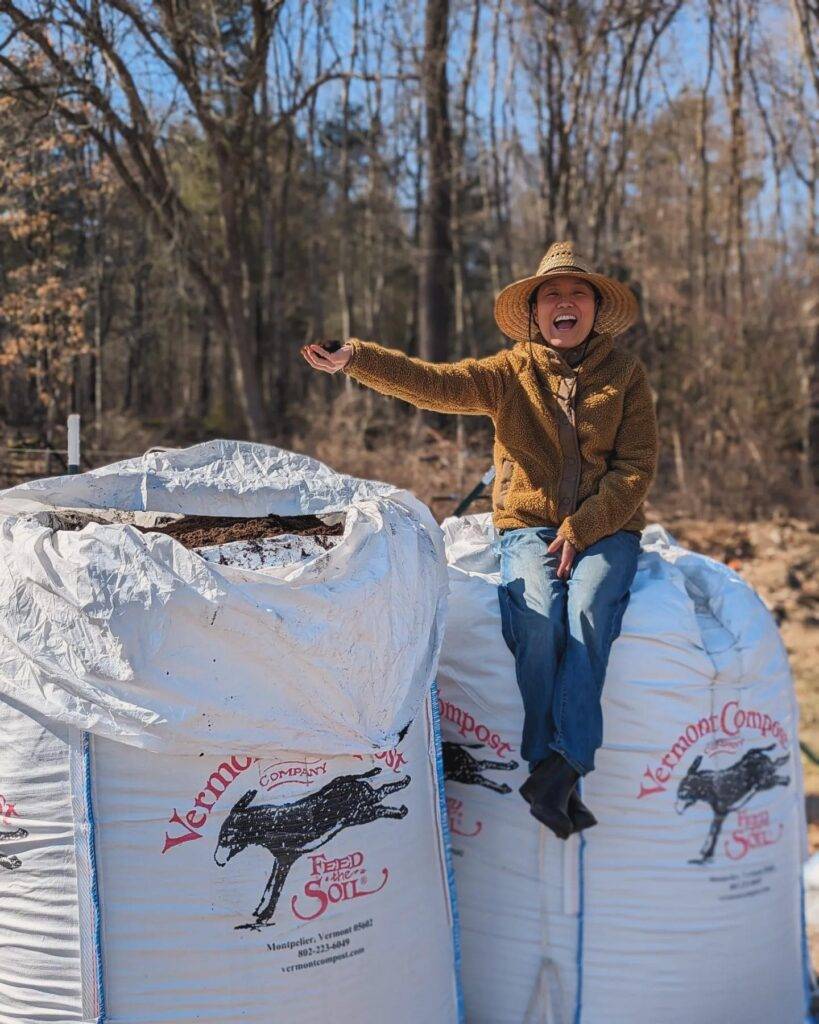
vermontcompost / Instagram
Buying Considerations for The Best Composts For Vegetable Gardens
Ingredients
As you’re looking for the best composts for vegetable gardens, the type and quality of ingredients are of crucial concern. Although exactly what you’re looking for will depend on your garden’s soil conditions and what types of vegetables you’re planning to grow, the presence of naturally sourced ingredients like manure, animal bone meal, and similar compounds is a good sign of a compost’s quality. Some products also have added fertilizers and bio-active ingredients, like endo- and ecto-mycorrhizae, which can have a big impact on soil health whether you’re growing in ground or in grow bags or a raised garden bed.
Type
Additionally, composts for vegetable gardens come in a variety of different forms, some of which are easier to use in certain contexts than others. For instance, Vermont Compost Company High-Nutrient Compost-Based Potting Soil for Plants & Vegetables is a pre-mixed combination of compost and soil, whereas the top pick on this list, Espoma Organic Land and Sea Gourmet Compost with Lobster & Crab Meal, is just pure compost. You can also find granule forms of compost, which break down in the presence of water, as well as compost starters that are meant to enhance the quality of a pre-existing compost pile.
Size
Finally, I think it’s fairly clear that composts aren’t the type of product you want to buy too much or too little of. If you don’t get enough, you’ll end up using too little on your vegetable patch and miss out on many of the benefits of using compost in the first place. And, having too much can be a pain also, as it’s bulky to store and won’t work as well the next growing season (since the organic parts of the compost mix won’t hold up well after all that time). I’d recommend calculating the ideal amount of compost you need before even looking at any products, and then finding a manufacturer who sells (around) the volume you need.
How I Choose These Products
I chose these products based on a combination of my own (rather extensive, if I say so myself) experience with using compost in my own garden and a ton of online research into how other gardeners have found the products on the list. Using both sources of knowledge is important, since what works in my own garden won’t necessarily work for everyone. But, I still get to use my own first-hand experience of the quality of various brands, as well as the use-cases that certain types of compost are ideal for. I hope you’ve been able to find the best compost for vegetable gardens for your unique needs!
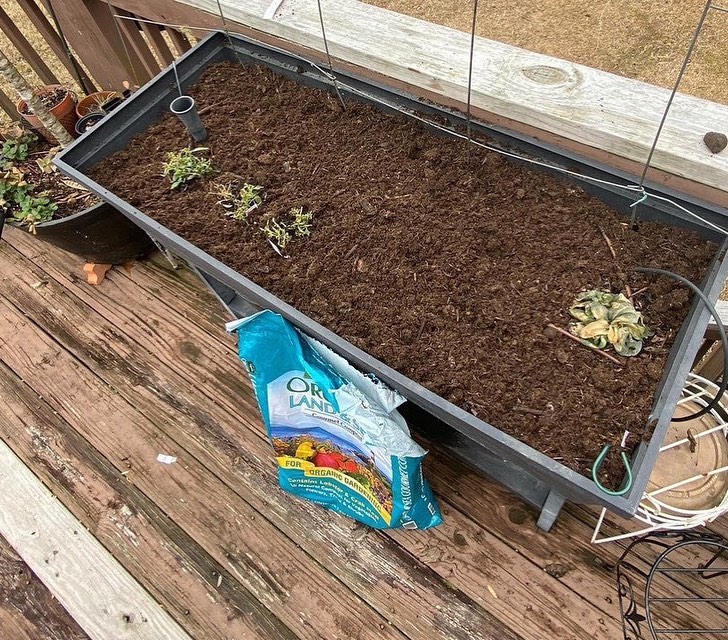
espomaorganic / Instagram
Final Verdict
Overall, I had to recommend Espoma Organic Land and Sea Gourmet Compost with Lobster & Crab Meal as the top pick among the best composts for vegetable gardens. The manufacturer puts out a consistently excellent product, no matter how many bags you go through, and the high quality of ingredients can lead to a huge increase in soil health and productivity. It’s simply a great choice for gardeners who are growing almost any type of vegetable.
FAQs
What kind of compost is best for a vegetable garden?
It’s best to use a compost that’s rich in nutrients and features heavily decomposed materials in your vegetable garden. There should be a roughly equal mix of green ingredients (like decomposing organic material) and brown ingredients (like peat moss or coconut coir) so that the compost helps your soil retain an airy texture that gives your plant access to both water and oxygen.
Can you use any compost for vegetables?
You can use almost any compost that’s nutrient-rich for growing vegetables. However, if you want to achieve the absolute best results, you should first research the acidity conditions that the exact vegetables you’re growing thrive in. Then, you can choose a compost that’s going to lead to more or less acidic soil conditions and provide your vegetables with the ideal growing conditions.
Is compost or manure better for vegetable gardens?
In general, compost is better for vegetable gardens than manure. That’s because compost contains manure (or a similar organic compound), but also other ingredients that contribute to soil health, such as decaying plant matter and peat moss. This mix of ingredients delivers a diverse set of benefits to your soil, while you get only some of them when you use pure manure in a vegetable patch.

